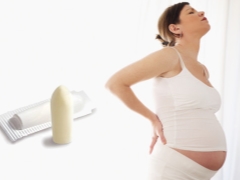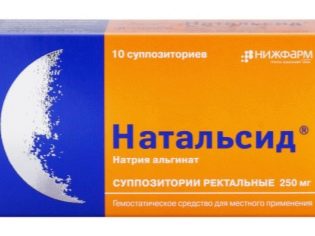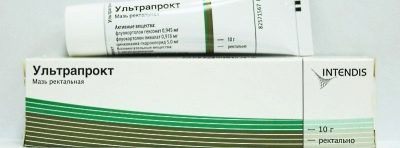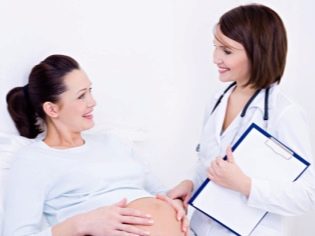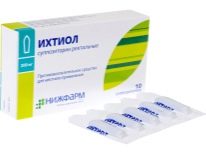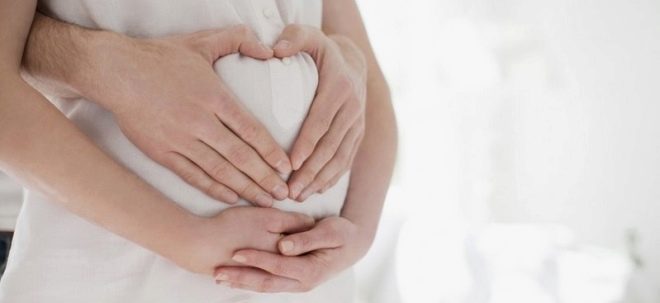What candles for hemorrhoids can be used during pregnancy?
Seven out of ten future moms in the process of carrying a child face an unpleasant and painful problem - hemorrhoids. The reasons may be different, but most often in the swelling and loss of the venous catch outside the anal sphincter the growing uterus is “guilty”, which squeezes the internal organs, disrupting the blood supply.
It is very difficult to treat hemorrhoids during pregnancy, since not all medicines can be used during pregnancy. About how future mothers choose rectal suppositories for getting rid of a delicate problem, we will tell in this article.
Principles of treatment of hemorrhoids in pregnancy
Treatment of hemorrhoids in pregnant women is a difficult task. Drugs for getting rid of an unpleasant ailment have been developed and sold a lot, but not all can be used by women in an “interesting position”. Strange as it may sound, the choice of medicine is a minor task. First of all, the doctor prescribes a woman to correct her lifestyle. Without this, no candles and ointments will help.
Task number one is to make the right diet. Since the development of hemorrhoids contribute to obesity and private constipation, then food should be light and not causing difficulties with defecation.
A pregnant woman suffering from hemorrhoids cannot be eaten, but you cannot starve for obvious reasons, either. It is best to eat 5-6 times a day, in small portions, making up the diet so that each meal is balanced - including carbohydrates, fats, proteins and monosaccharides.
On the table of the future mother should be fresh vegetables and fruits in large quantities, because the fiber, which is contained in them, facilitates the excretion of feces. Useful products such as prunes, honey, boiled beets and beet juice.
Do not allow the abundance of protein food, because it contributes to constipation - Meat, fish, cottage cheese need to eat just enough to meet the needs of the baby growing under the heart in proteins. The excess of these products leads to difficulty defecation.
Pregnant women should completely abandon the fried and spicy, from eating any spices, from baking yeast dough, baking, factory sweets and chocolate. Also contraindicated products that enhance the formation of intestinal gases - sparkling water, beans and cabbage.
Such a diet should be followed by a woman all the time remaining until the birth of the child, in order to avoid recurrences of hemorrhoids.
In addition to nutrition, the treatment regimen includes well-designed and planned physical activities. Given the special situation in which a woman is located, you should not burden yourself with exercises in the gym, but you should not sit on the couch with hemorrhoids either.
A woman should introduce a rule - every day to walk in the fresh air, do gymnastics, which will be aimed at strengthening the muscles of the anal sphincter and preventing malfunction of the blood supply to the lower veins, which include hemorrhoidal veins.
The third mandatory component of successful treatment of hemorrhoids in pregnancy is the correct approach to the process of defecation. Toilet paper can not be used. It is best to wash under running water without using soap after each trip to the toilet.
It is important to ensure that the defecation is held in a "single reception". If it lasts more than five minutes, when a woman is sitting on the toilet waiting for a new wave of intestinal peristalsis, the blood supply to the hemorrhoidal veins is disturbed, and the situation may worsen. If at one time it was not possible to empty the intestines completely, one should leave the toilet and return there in thirty to forty minutes.
Enemas can be included in the treatment regimen to combat constipation. But during pregnancy, traditional enemas with a large amount of fluid are undesirable, it is best to use microclysters, for example, "MicrolaxOr homemade microclysters with sea buckthorn oil. They allow you to quickly cope with constipation and have a local healing and anti-inflammatory effect.
Women who suffer from hemorrhoids during pregnancy often receive referrals for physiotherapy. In the clinic at the place of residence they hold sessions of magnetic therapy, physiotherapy exercises. But surgery in the waiting period of a child is rather a rarity, a necessity caused by a severe form of hemorrhoids, massed by anal bleeding, dropped out knots that cannot be manually set.
The treatment regimen also includes medications, moreover, both systemic, with a common venotonic and anti-inflammatory effect, as well as local ones - candles, ointments and gels.
Sometimes the treatment regimen consists of a combination of systemic and local drugs.
In cases of small hemorrhoids of grade 1–2, it is possible to do only with local means, provided that the woman will strictly follow all other recommendations - adhere to proper nutrition, moderate but sufficient physical activity, do gymnastics, monitor bowel movements and go to physiotherapy.
Local preparations
Local preparations almost do not enter the systemic circulation, and therefore their effect on the growing baby is minimal. In pregnancy, topical antihemorrhoids are of two kinds — rectal suppositories and ointments (or gels).
They all possess anti-inflammatory action, many contain painkillers, almost all have wound-healing effects. Some drugs are composed of substances that can stop the bleeding and strengthen blood vessels.
It is most difficult to find the right products for pregnant women who have symptoms of a delicate disease in the first trimester. Up to 14 weeks is not desirable to use drugs in general.Therefore, it is important that the selected medicine is natural and has a minimum of side effects.
In the second and third trimester of pregnancy the choice of drugs is much wider. In many pregnant women, the symptoms of hemorrhoids, which began during pregnancy, persist for some time after giving birth, and in some women they increase after birth, so the question of choosing suppositories for nursing mothers is also relevant.
There are also few such drugs. We have prepared a list of approved drugs for expectant mothers and newly born women. This information is exploratory in nature; only a doctor should prescribe a medicine.
Allowed in 1 trimester
Relief
Under this name, a whole line of medicines with antihemorrhoidal effect is produced, only one drug from the line, Relief Advance, is allowed for pregnant women. About him and talk in more detail.
The main active ingredient is benzocaine, as additional ingredients, candles and Relief Advance ointment contain shark oil and cocoa bean oil. Suppositories are white or slightly yellowish.The ointment with the same name is sold complete with an applicator that facilitates the administration of the drug.
The composition of the drug is selected in such a way that the three main effects of the application are anti-inflammatory, wound healing and anesthetic.
The side effects are minimal - manufacturers indicate that itching and swelling may appear in a sore spot after using the remedies only if they are applied incorrectly.
Candles are introduced 4 times a day - in the morning and in the evening before bedtime, and after each bowel movement 1 candle at a time. The ointment is used similarly, and it can be applied not only topically, but also administered rectally using an applicator.
The course of treatment is a week. If after 7 days of use the woman did not feel relief, you should definitely contact the proctologist. If in the process of treatment appeared bleeding from the rectum, the drug is canceled and immediately turn to the proctologist.
"Natalsid"
This is a very popular remedy for hemorrhoids during pregnancy. The main active ingredient is sodium alginate. In addition to it, in the composition of suppositories only solid fat, which is completely dissolved after administration.
With hemorrhoids with blood, the candles stop bleeding fairly quickly and almost immediately begin to promote healing of the injured mucous membranes and fissures.
Side effects are quite rare. They are manifested in a moderate allergic reaction, the appearance of pruritus, peeling. Information about overdose is not available today. The drug is approved for admission at any stage of pregnancy, including its first trimester, it does not adversely affect the embryo and fetus.
Daily dosage - 2 candles. One is administered in the morning, another in the evening. You can enter the drug after defecation at another time of day. The course of treatment from 7 to 14 days. Before the introduction, manufacturers recommend slightly moisten the suppository with plain water.
"Alginatol"
These candles in their composition and principle of operation are analogous to "Natalsid". Active ingredient - sodium alginate.
Despite the chemical name, the substance has a natural origin, it is extracted from brown algae. A drug quickly stops bleeding and repairs damaged tissue.
Candles can be used up to four times per day. One candle is inserted at a time. The recommended regimen is in the morning, in the evening and after each self emptying of the intestines or an enema.
There are practically no side effects of the drug, only a small probability of an individual reaction to the main component of the drug is indicated.
The course of treatment is from a week to two weeks. If the need for the application and after this time remains, after a short break, you can resume the procedure. A feature of the application, as in the case of the preparation "Natalcide", is the need to moisten the suppository with water before introducing it into the rectum.
"Sea buckthorn"
These candles are useful not only for hemorrhoids. In the process of pregnancy, women sometimes face the need to take advantage of the healing effects of sea buckthorn oil and to treat gynecological problems.
The composition of the drug only natural ingredients - sea buckthorn oil and solid fat. Rectal suppositories have an orange or bright orange color and smell typical of sea buckthorn.
Sea buckthorn oil quickly heals the injured mucous membranes, helps relieve swelling, reduce pain.
The course of treatment may exceed two weeks, because sea buckthorn oil does not have any harmful effects on the organisms of the mother and baby.
The recommended treatment regimen is 1 candle twice a day. The number of suppositories can be increased to three.
Among the side effects indicated are individual allergic reactions to sea buckthorn.If this type of allergy is not, the drug can be safely used at any stage of pregnancy.
Allowed in the 2nd and 3rd trimester
"Ultraprokt"
At the heart of this drug are two active ingredients - fluocortolone and cinchocaine hydrochloride. Castor oil is used as an excipient. This drug is available in both suppository form and ointment form.
Packaging ointment is completed with a special tip to facilitate the application.
The spectrum of action of the drug is quite wide - it has antipruritic effect, quickly copes with an unpleasant burning sensation in the anus. Remedy well relieves pain, prevents puffiness and inflammation.
The undoubted advantage is that Ultraprokt operates very quickly and for a long time.
In the first trimester of pregnancy, the drug is officially banned, but in the second and third, its use is quite possible. If used improperly, side effects are possible, for example, if you use candles continuously for more than 4 weeks in a row, you may experience dry skin in the anus, atrophy of the skin and mucous membranes.
Standard dosage is 2 candles per day. Sometimes the doctor may recommend 4 candles per day, the dosage of the ointment is similar. After the state of health begins to improve, it is recommended to take the drug for some time to fix the result (no more than a week), but reduce the dose by half.
The ointment is squeezed directly into the rectum, using your own fingers and the applicator offered in the kit. Candles are introduced in the traditional way.
If a pregnant woman has multiple drops of venous nodes, it is recommended to first use the ointment, while carefully setting the nodes inside.
An overdose can occur only if a woman for some reason swallows a certain amount of rectal suppositories.
Negative reactions from the central nervous system can cause the anesthetic component of the drug, which is cinchoin hydrochloride. Also Avoid contact with eyes.
"Hepatrombin G"
As part of the drug heparin, prednisone and lauromacrogol. The drug on the shelves of pharmacists exists in the form of ointment and in the form of rectal suppositories.
The ointment can be applied not only topically, but also to be administered rectally, for this purpose there is a special tip in the package.
Active ingredients strengthen blood vessels, prevent thrombosis, and also help to get rid of itching in the anus, eliminate pain and prevent the development of edema and inflammation. The drug is forbidden to use during pregnancy in the early stages, but from the 14th week the agent can be taken.
Candles are injected up to three times a day after each act of defecation, a thin layer of ointment is applied to the affected place and lightly rubbed. If necessary, enter the ointment into the rectum using a special tip.
Usually pregnant women use this drug as a first aid for exacerbation of hemorrhoids, for the prevention of this unpleasant disease during pregnancy, it is better to choose a milder drug.
"Anuzol"
Pregnant women in the second and third trimesters are allowed to take the drug from this line called "Anuzol Neo". These are rectal candles of greenish color, the main active ingredient of which is zinc oxide.
Candles have a drying, antiseptic and anti-hemorrhoidal effect. They relieve pain, help to reduce knots and relieve inflammation.
Candles are introduced in the supine position for 7-10 days, 1-3 candles per day. The exact dosage of the drug prescribed by the attending physician. There are almost no side effects of the drug, there is also no data on overdose.
During breastfeeding
"Ichthyol"
The main active ingredient of these rectal suppositories is ichthyol, which heals, relieves pain, acts as a strong antiseptic. The candle lasts for more than 12 hours, and therefore only one injection of one candle per day is recommended. When running hemorrhoids, you can use no more than 2 candles per day.
Side effects are allergic reactions to ichthyol, which are most often manifested by the appearance of skin rash, local redness and a strong burning sensation in the anus. But such a scenario is rather a rarity.
Candles are allowed for use at any stage of pregnancy, as well as after childbirth, because the active ingredient has no effect on the fetus or the breastfed baby.
In addition to these candles, lactating mothers can use products that are allowed in the first trimester - Alginatol and Sea Buckthorn.
Reviews
According to reviews of future and successful mothers, it is rectal suppositories that are the most popular means of treatment for hemorrhoids while carrying a baby. They are easy to use and quite effective. Most often pregnant choose "Natalsid" and "Relief"It is precisely to these that doctors have traditionally been prescribed in the antenatal clinic.
These remedies help quickly, but with most pregnant women, hemorrhoids return with time, so experienced mothers always advise to keep a package of candles in the refrigerator.
It is also useful to have ready ice in the freezer, since it helps to relieve itching and burning at the very initial stage before applying the candle or immediately after the injection.
The greatest number of negative reviews about drugs such as "Ultraprokt", According to pregnant women, the pain and unpleasant knockout of the nodes after a course of treatment returns as early as the second week and you have to start all over again, and these combined drugs have a much wider list of side effects than "Sea-buckthorn", "Ihtiolovyh" and other natural candles.
Despite the effectiveness of candles, some after giving birth still had to give consent to surgery, since childbirth exacerbates the process.
Prevention and appropriate drugs
Prevention of exacerbation of hemorrhoids during pregnancy and its primary manifestation is in compliance with a proper balanced diet, as well as a mode of sufficient mobility and activity.
A woman should walk, walk, do exercises, easy non-burdensome gymnastics. It is important to control weight gain, avoid obesity. During pregnancy, you should be more attentive to safety during anal sex, and it is better to cancel it altogether.
It is important to avoid prolonged constipation. Since this trouble often accompanies the state of pregnancy, you can use certain drugs to prevent constipation and prevent the development of hemorrhoids:
"Glycerol"
These candles with glycerol have a laxative effect, and therefore they can be taken as prevention of constipation during pregnancy and during breastfeeding. From the hemorrhoids that have begun, they will not help, since they are only effective in questions of diluting and excreting the feces, but may well supplement the standard treatment regimen with another drug.
It is best to enter them 15 minutes after breakfast. The toilet can usually successfully go in 20-30 minutes. Use of the drug during pregnancy should always be coordinated with the attending doctor.
For the prevention of hemorrhoids and its treatment in the initial stages of pregnancy, the expectant mother can use effective and inexpensive calendula rectal suppositories, papaverinewith propolis.
To learn how to properly insert a rectal suppository, see the following video.
